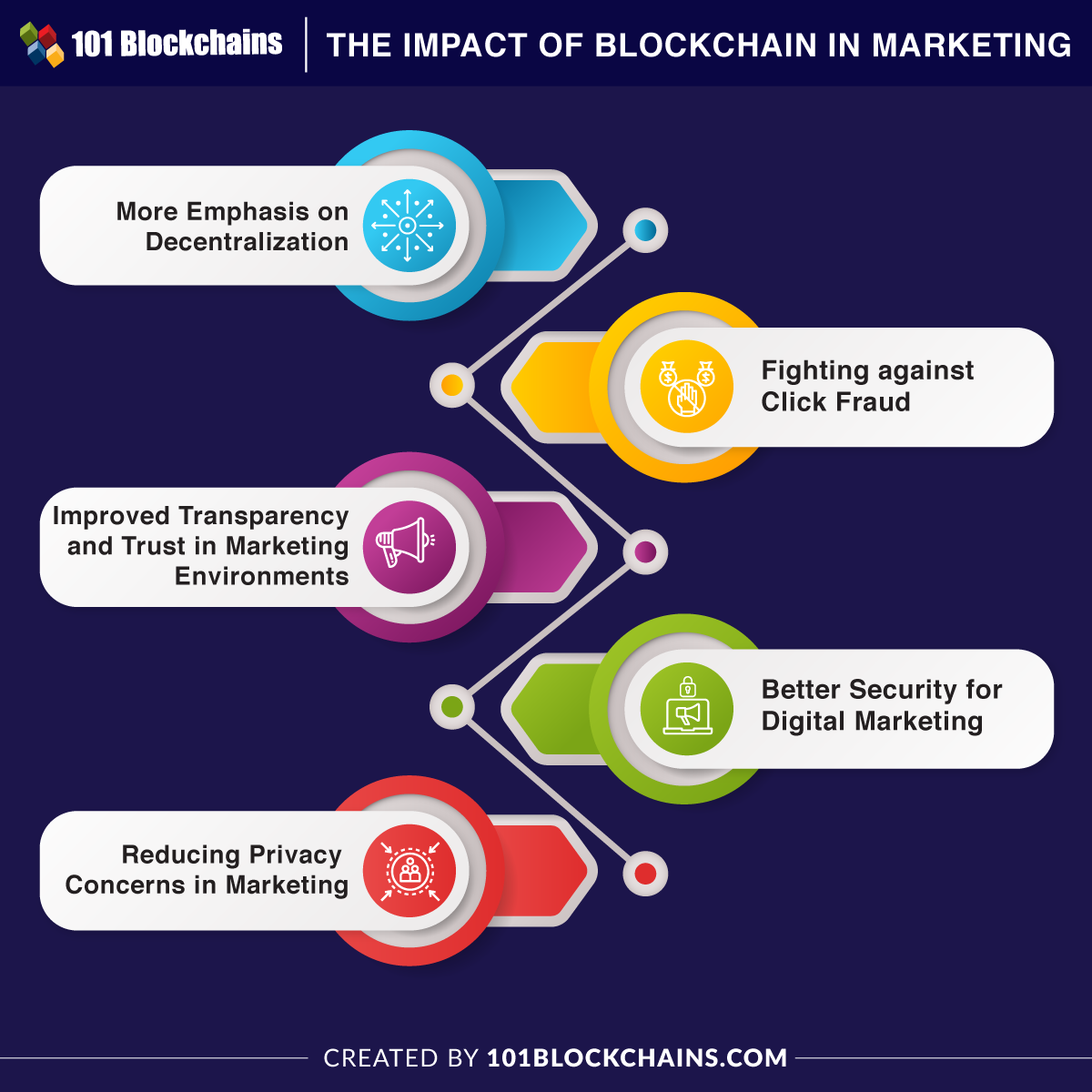The growth of modern ecommerce platforms with mobile functionalities has been one of the important highlights in B2C commerce. The arrival of ecommerce changed many conventional organizational structures and transformed the value creation process comprehensively. At the same time, applications of new technologies such as blockchain in marketing have been changing the traditional dynamics of brand marketing. The internet provides many opportunities for marketers to help them create new online marketplaces and enter new spheres in their existing markets. However, the introduction of blockchain has brought some significant changes in the way people and businesses use the internet.
In such cases, an overview of the impact of blockchain technology on marketing would help you familiarize with how blockchain will transform marketing now and in the future. The following post offers you an outline of the potential impact of blockchain technology on the marketing activities of an organization or brand.
Want to learn blockchain technology in detail? Enroll Now in Certified Enterprise Blockchain Professional (CEBP) Course
Importance of Marketing
If you want to know the importance of blockchain for marketing, then you must know about the significance of customer-centric marketing. The competitive B2C markets in the present times call for organizations to reach out to customers. At the same time, customers must have the necessary skills to communicate the value for a consumer from their goods or services. The communication methods followed by organizations have been changing gradually from one industry to another over the course of time.
However, the primary objectives and risks pertaining to consumer engagement would remain the same for marketing in any era. The need for a blockchain marketing strategy seems evident for organizations thriving in an era of transformation of the internet into a decentralized web. As the internet expanded over the course of history and new technologies emerged gradually, the influence on the traditional marketing mix became quite clear.
Modern technologies have created the need to emphasize on the elements of security, transparency, trust, and privacy. Consumer concerns regarding privacy have been growing considerably in the past few years. Where does blockchain come into the picture? Can it resolve these challenges?
Role of Blockchain in Marketing
Blockchain technology has created substantial hype alongside showcasing proof of its value through proven use cases in different sectors. For example, blockchain has found some notable use cases in the industries of finance, healthcare, real estate, and supply chain management. Therefore, marketing is obviously not an exception in the potential use cases of blockchain. Most of you wondering about answers to “How is blockchain used in marketing?” could figure out the same in the traits of blockchain technology. Let us take a look at the different features of blockchain which make it a suitable fit for blockchain.
Start learning Blockchain with World’s first Blockchain Skill Paths with quality resources tailored by industry experts Now!
How is Blockchain Suitable for Marketing?
The global financial crisis in 2008 shattered the foundations of trust in the traditional banking system. During this time, the arrival of the peer-to-peer electronic cash system, Bitcoin, showed the use of cryptographic mechanisms for processing financial transactions. The cryptographic mechanisms underlying Bitcoin include hashing, consensus mechanisms, asymmetric encryption, and time-stamping.
Bitcoin resolved the problem of double-spending while setting a new precedent for carrying out financial transactions and exchanging value in online environments. Furthermore, the effect of blockchain in marketing would also focus on how the working of blockchain focuses on verifying the validity of transactions. It is impossible to tamper with the public transaction records on blockchain as all the transactions as sequentially arranged in the blocks with timestamps.
The applications of blockchain for marketing would introduce prolific changes in interactions between a customer and businesses. Blockchain brings the value of multiple technologies and, most important of all, a distributed ledger of transactions carried out by parties involved in the blockchain network. The basic objective of blockchain technology focuses primarily on authentication of assets with the flexibility for application in other business activities.
Want to become a bitcoin expert? Enroll Now in Getting Started with Bitcoin Technology Course
Effect of Blockchain on Marketing
Blockchain technology is highly disruptive in nature, and its impact on the market is not under wraps. Most recently, blockchain technology has successfully introduced massive waves of change with value advantages in use cases such as asset management and tracking alongside regulatory compliance.
Blockchain technology has offered new avenues of productivity, albeit in the initial stages for different sectors. However, the lack of research on potential of a blockchain marketing strategy can create notable ambiguities pertaining to the significance of blockchain technology for marketing.
Here are some of the important ways in which blockchain could influence marketing for organizations.
-
More Emphasis on Decentralization
The internet provided the initial push for decentralization and offered drastic changes in the distribution of products and services by companies. New digital intermediaries replaced the traditional intermediaries by offering a wide range of services and solutions for modern commerce.
Some of the examples of services by new ecommerce intermediaries include trust provision, online search capabilities, communication, information brokering, and advertising. In addition, social networks such as Facebook, Instagram, and Twitter offer new ways for brands to reach their customers. The existing digital intermediaries seem to be doing the job of marketing a business to its target audience.
However, the centralized digital intermediaries can lock your data in their control, which increases the need for a business to depend more on them. On top of it, managing your communication channels alongside concerns about monetizing customer data also create doubts regarding the existing digital technologies for marketing.
Blockchain could offer an ideal solution to all these concerns effectively with a tool that supports businesses and customers moving around the challenges of intermediaries. Therefore, the answer to “How is blockchain used in marketing?” would reflect on the capabilities of decentralization.
Brands could improve customer targeting alongside enhancing service responsiveness and expanding their advertising campaigns. The interactive and ubiquitous features of blockchain help marketers in communicating advertising content to customers. The applications of blockchain technology in decentralized marketing could help in removing the activities which don’t add any value to the marketing process.
Brands could also offer incentives for customers in the form of loyalty programs, thereby improving the prospects for strengthening the direct relationship between consumers and brands. At the same time, decentralization with blockchain technology could offer a new model for better consumer engagement and collaboration.
Start your blockchain journey Now with the Enterprise Blockchains Fundamentals – Free Course!
-
Fighting against Click Fraud
The lack of examples of blockchain in marketing industry can be one of the most important reasons for limited investigation in this field. Communication is an important tool for customers to know about the latest products, services, and other updates. However, the importance of an online business also comes under question owing to the multiple scandals and fraud campaigns.
With the popularity of online sponsored search in the business models for various search engines, click fraud has emerged as a notable setback for online advertising. Click fraud has become quite popular due to automated digital marketing and better methods for target marketing. It is actually an intentional act where an organization or an individual attempts to influence the advertising budget of a competitor.
The necessity of blockchain in marketing is clearly evident in the ability to fight against click fraud. As a matter of fact, the severity of click fraud can show how it can be a major threat to digital marketing. It can account for additional costs for marketers in the amount of $44 billion by 2022.
Blockchain can reduce specific risks associated with click fraud through a trustworthy digital marketing environment for brands and customers. Blockchain-based marketing would focus on encouraging participants in the marketing sector to work in an open and shared environment, with every individual serving their roles with integrity and honesty.
One of the instances for using blockchain technology in fighting click fraud would refer to the resolution of information asymmetry concerns. The collaborative operations would help in improving control and supervision over publishers through detailed analysis of credibility, historical information, and qualifications.
One of the examples of blockchain in marketing for dealing with click fraud refers to adChain platform. The platform works as a transformative protocol in the field of marketing technology with innovative facilities for marketers, such as real-time lead tracking and campaign audits. The adChain protocol also leverages the immutability of blockchain to prevent pay-per-click providers from accessing the benefits of fraudulent traffic and ad clicks.
-
Improved Transparency and Trust in Marketing Environments
Blockchain offers the benefits of decentralization as the answer to the control of digital intermediaries over the marketing process and decisions of a business. At the same time, it is also important to note how consumer confidence in brands has been dwindling at unparalleled rates.
If you want to build a blockchain marketing strategy, then you must understand that the quality of the technical infrastructure determines the level of trust of consumers in the marketing campaign of a brand. Blockchain can help to fuel trust and transparency in the domain of online marketing by allowing consumers and brands to work in a transparent and secure ecosystem.
The most striking highlight of blockchain technology refers to the advantage of trust by design as the trust protocol underlying blockchain provides assurance regarding the honesty and integrity in behavior of the brand and marketing professionals.
A credible blockchain marketing agency would work towards the creation of consumer-centric transparency, particularly in scenarios where consumers have to share their personally identifiable information or PII.
In addition, blockchain can also improve trust and transparency by fighting against malicious marketing for counterfeit products, which affect the intellectual property or IP rights pertaining to original manufacturers. Furthermore, the improved visibility and ability to verification of compliance obligations alongside end-to-end product traceability could also deliver better transparency into how a business works.
Get familiar with the terms related to blockchain with Blockchain Basics Flashcards.
-
Better Security for Digital Marketing
Blockchain has been developed on the foundations of cryptographic mechanisms for ensuring security. The discussion on a blockchain marketing strategy would focus on security threats as the circumstances, conditions, or events, which pose formidable risks for marketing campaigns and systems.
Before adding the element of information security in their marketing campaigns, businesses must work on developing a strong technological infrastructure to resolve the existing loopholes alongside improving the trust of consumers in the digital marketing landscape. Blockchain technology could provide exclusive benefits for consumers and brands with decentralized and distributed data storage.
In addition, you can also capitalize on the functionalities of different security mechanisms such as access control, asymmetric encryption, and digital signatures. These security mechanisms can help in safeguarding the processes for storing, transferring, and retrieving massive volumes of consumer information.
Blockchain technology offers a new method for decentralization and self-organization of a business ecosystem with effective synchronization and integration of marketing-related information among network members. The information can include product listings, marketing plans, pricing policies, market research and analysis outputs, discounts and promotional benefits, and advertisements.
Consumers could make the most of blockchain in marketing with access to a single source of truth about the values, traits, and offerings of a brand. Most important of all, the lack of a single point of failure also provides better assurance of security for digital marketing campaigns.
-
Reducing Privacy Concerns in Marketing
The work of a blockchain marketing agency is not limited to ensuring security, trust, and transparency in the marketing process. Privacy is one of the critical issues which affects the decisions of an individual about using a specific online technology service. Research has proved that customers are concerned about anonymity and confidentiality of their online transactions.
The increased risks of manipulating users into divulging their PII have been responsible for increasing concerns regarding privacy. On top of it, you can also notice how new data collection and data mining technologies can help brands in identifying, tracking, and collecting consumer data. However, blockchain technology can help in resolving various issues pertaining to privacy in digital marketing.
One of the notable examples of blockchain in marketing for privacy would refer to anonymity of users in a transaction. Transactions on blockchain are not associated with real identities, and configuration in controlling access of network members to block information can help in improving privacy.
While transactions are verified by the whole network, no one knows about the details of parties involved in the transaction. At the same time, the use of blockchain for marketing also sheds light on the possibilities for consumers to use transactional history to develop more control over PII in digital marketing initiatives.
The transaction history on blockchain could provide better and more robust analytics with privacy protection for users. Consumers of a specific brand could also explore the opportunities for trading their PII with brands securely in return for services or incentives.
Want to learn how to design and develop secure blockchain systems and distributed applications? Enroll Now in Certified Blockchain Security Expert (CBSE) Course
Bottom Line
The overview of the potential improvements in adopting blockchain technology for the marketing sector shows that it is a valid bet. Blockchain is inherently the ideal technology for marketing by its design, which enables decentralization, security, and privacy. The work of a blockchain marketing agency would primarily focus on incorporating these benefits in your existing marketing strategies with scope for improvement.
Blockchain technology can facilitate the security of digital marketing initiatives alongside supporting consumers in taking control of their data. With the applications of blockchain technology in marketing, brands could also seek plausible improvements in capabilities to fight against scams such as click fraud. Brands could leverage blockchain technology to introduce credible value advantages in optimizing the cost of their marketing campaigns. Learn more about the use cases for blockchain technology in the field of marketing.
Join our annual/monthly membership program and get unlimited access to 25+ professional courses and 55+ on-demand webinars.





